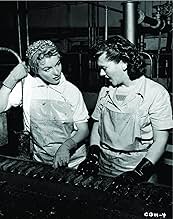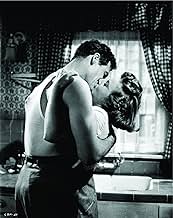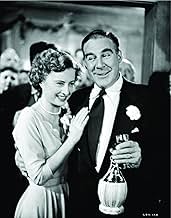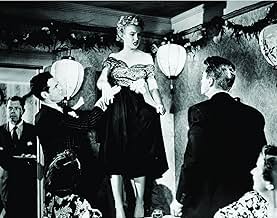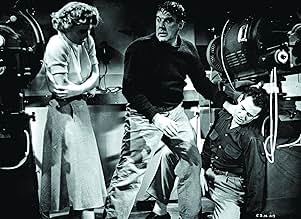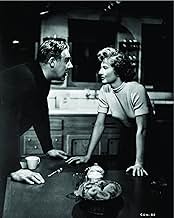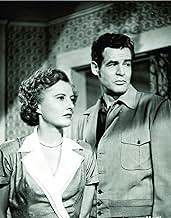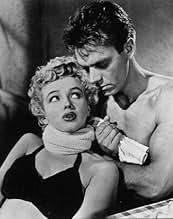CALIFICACIÓN DE IMDb
7.0/10
8 k
TU CALIFICACIÓN
Mae Doyle regresa a su ciudad natal convertida en una mujer cínica. Su hermano Joe teme que su amor, Peggy, acabe como Mae. Mae se casa con Jerry y tiene un hijo, es feliz pero está inquieta... Leer todoMae Doyle regresa a su ciudad natal convertida en una mujer cínica. Su hermano Joe teme que su amor, Peggy, acabe como Mae. Mae se casa con Jerry y tiene un hijo, es feliz pero está inquieta, atraída por Earl, el amigo de Jerry.Mae Doyle regresa a su ciudad natal convertida en una mujer cínica. Su hermano Joe teme que su amor, Peggy, acabe como Mae. Mae se casa con Jerry y tiene un hijo, es feliz pero está inquieta, atraída por Earl, el amigo de Jerry.
- Dirección
- Guionistas
- Elenco
- Premios
- 3 premios ganados en total
William Bailey
- Waiter
- (sin créditos)
Harry Baum
- Restaurant Patron
- (sin créditos)
Dan Bernaducci
- Guest
- (sin créditos)
Albert Cavens
- Restaurant Patron
- (sin créditos)
Dick Cherney
- Fisherman
- (sin créditos)
Charles Cirillo
- Restaurant Patron
- (sin créditos)
Irene Crosby
- Guest
- (sin créditos)
Russell Custer
- Fisherman
- (sin créditos)
Tony Dante
- Fisherman
- (sin créditos)
Roy Darmour
- Man
- (sin créditos)
- Dirección
- Guionistas
- Todo el elenco y el equipo
- Producción, taquilla y más en IMDbPro
Opiniones destacadas
Why did Fritz Lang want to make this movie? Did he select the cast? "Clash by Night" was part of the recent TCM tribute to Lang, and following after the early European masterpieces, "Metropolis," and "M," one wonders how much Lang modified and compromised his early filmmaking ideals and style in resettling in Hollywood and jockey for financial support. I've not seen or read the original Odets play on which the film is based, but whatever Lang's reason for choosing it, one has to ask how the finished movie fits into Lang's output, especially the stark, powerful, stylized early pieces. A couple of features stand out: Lang always had a message-- nothing was mere observation -- that shaped the plot and characters' motivations. If Good and Evil stand out too sharply in black and white terms, Lang is still intent on sharp analysis of the turns and twists on the road to Good or Evil. Forces beyond individual characters' control are harnessed and made part of the characters motivations. Then Lang sets them on their inevitable course, and we watch, sometimes in shock or agony.
In "Clash," the imagery-- contrasting shots of sea, clouds, birds,etc, register his endorsement of the natural order of things as Good. In Metropolis, the natural order of humanity toward others was stamped out by the drive for materialism and industrial supremacy, Evil (historically predicating Nazism), symbolized always by the grinding and spouting machinery. All of the characters are tuned to a high pitch and respond with intensity. Lang's style of directing brought out the extremes -- the fortissimos-- in his actors, no matter whom he cast. Lang must have been an extraordinarily demanding director to elicit such razor-edge performances from his actors.
The fact that all the actors in "Clash" are familiar to us from other films meant Lang had to pit them against each other to an even keener degree. They are all desperate for something, whether they reveal it on the surface or not. For an actress like Stanwyck, this was an easily achieved emotional state, and she had to accept the concept of "aging" in her role. If anything, Lang forced her to keep her hard edges up a bit too much, allowing some softening only in the rather quick ending. This bit of character transformation happens only after she sees the true desperation that she's driven Paul Douglas to in the final scene in the film room.
Ah, yes, the film room. If that isn't an obvious set piece, I don't know what is. Ryan, as the third wheel, runs the projectors. Much of his dialogue is double-edged. And Ryan's character is the most desperate, the least yielding, even to Stanwyck, making his profession as a film projectionist ironic and something artificial, compared to the "natural" metier of Douglas and his father's as fishermen. They draw on the bounty of nature and so symbolize -- purposely and obviously -- pure goodness in human nature. Douglas gives a generous, sweet-tough-guy performance that is Ryan's match. Douglas never guesses what temptation he presents to his wife Stanwyck when he casually invites his best friend to stay with them. This generosity extends in particular to his overlooking faults, whether of his leeching uncle or his friend's sarcstic selfishness.
The role of the father, as a link to the Old Country and its solid gold ways is well-placed. His speech at the wedding puts his character in a nutshell: God made love, God made wine, God made friends, let everyone enjoy them, or some such pithy message. For a filmmaker like Lang, and other transplanted Europeans, the sacrifice of deep roots of their heritage and language could only be compensated for by an equally deep absorption of the customs and values of the New Country. Emigré geniuses like Lang, Wilder, or von Stroheim, never left anything behind, they reabsorbed and refashioned their material through their sharp perception of human nature in this new context. I think that is why we feel this movie to be beyond mere melodrama. I couldn't stop watching it -- the characters caught me in their predicament: they reach a universal dimension in the very simplicity and obviousness of their situations and temptations. Lang's role was to push them to that level recognition in themselves.
Even the seemingly secondary characters like Stanwyck's brother and his girlfriend, the latter played surprisingly and delightfully by a young Marilyn Monroe, give strong performances. Marilyn already shows her subtlety and emotional vulnerability. Her spontaneous response to Stanwyck's return to her brother's apartment at the beginning revealed a genuine charm, and she provided a needed sparkle in this otherwise grim film.
So why see "Clash"? Even a secondary work by a master bears his mark, and to see the mark and its features in the context of film history is still a worthwhile effort.
Of Four ****, three ***.
In "Clash," the imagery-- contrasting shots of sea, clouds, birds,etc, register his endorsement of the natural order of things as Good. In Metropolis, the natural order of humanity toward others was stamped out by the drive for materialism and industrial supremacy, Evil (historically predicating Nazism), symbolized always by the grinding and spouting machinery. All of the characters are tuned to a high pitch and respond with intensity. Lang's style of directing brought out the extremes -- the fortissimos-- in his actors, no matter whom he cast. Lang must have been an extraordinarily demanding director to elicit such razor-edge performances from his actors.
The fact that all the actors in "Clash" are familiar to us from other films meant Lang had to pit them against each other to an even keener degree. They are all desperate for something, whether they reveal it on the surface or not. For an actress like Stanwyck, this was an easily achieved emotional state, and she had to accept the concept of "aging" in her role. If anything, Lang forced her to keep her hard edges up a bit too much, allowing some softening only in the rather quick ending. This bit of character transformation happens only after she sees the true desperation that she's driven Paul Douglas to in the final scene in the film room.
Ah, yes, the film room. If that isn't an obvious set piece, I don't know what is. Ryan, as the third wheel, runs the projectors. Much of his dialogue is double-edged. And Ryan's character is the most desperate, the least yielding, even to Stanwyck, making his profession as a film projectionist ironic and something artificial, compared to the "natural" metier of Douglas and his father's as fishermen. They draw on the bounty of nature and so symbolize -- purposely and obviously -- pure goodness in human nature. Douglas gives a generous, sweet-tough-guy performance that is Ryan's match. Douglas never guesses what temptation he presents to his wife Stanwyck when he casually invites his best friend to stay with them. This generosity extends in particular to his overlooking faults, whether of his leeching uncle or his friend's sarcstic selfishness.
The role of the father, as a link to the Old Country and its solid gold ways is well-placed. His speech at the wedding puts his character in a nutshell: God made love, God made wine, God made friends, let everyone enjoy them, or some such pithy message. For a filmmaker like Lang, and other transplanted Europeans, the sacrifice of deep roots of their heritage and language could only be compensated for by an equally deep absorption of the customs and values of the New Country. Emigré geniuses like Lang, Wilder, or von Stroheim, never left anything behind, they reabsorbed and refashioned their material through their sharp perception of human nature in this new context. I think that is why we feel this movie to be beyond mere melodrama. I couldn't stop watching it -- the characters caught me in their predicament: they reach a universal dimension in the very simplicity and obviousness of their situations and temptations. Lang's role was to push them to that level recognition in themselves.
Even the seemingly secondary characters like Stanwyck's brother and his girlfriend, the latter played surprisingly and delightfully by a young Marilyn Monroe, give strong performances. Marilyn already shows her subtlety and emotional vulnerability. Her spontaneous response to Stanwyck's return to her brother's apartment at the beginning revealed a genuine charm, and she provided a needed sparkle in this otherwise grim film.
So why see "Clash"? Even a secondary work by a master bears his mark, and to see the mark and its features in the context of film history is still a worthwhile effort.
Of Four ****, three ***.
clash by night is a great example of what a difference great acting can make. those were the days! story is full of usual cliches, but stanwyck, paul douglas, robert ryan, and a young marilyn monroe: wow!!! and it shows how sexy a film can be without any "sex scenes" or even a hint of nudity.
This Fritz Lang film has been largely ignored though in it's way it is as psychologically astute as many of his better known works such as "Scarlett Street". In transposing a Clifford Odets play from New York to a Californian fishing community some of the more florid dialogue seems unnaturally heightened but the performances of the three principals (Barbara Stanwyck, Robert Ryan and particularly Paul Douglas) are stunning and the emotional core of the film is so strong that an audience can feel bruised by what's on screen. The blue collar milieu is perfectly evoked, the black-and-white cinematography by Nicholas Musuraca is first-rate and even the score seems understated, adding to, rather than detracting from the dramatic effect. Essential viewing.
Barbara Stanwyck, Paul Douglas, Robert Ryan, Marilyn Monroe, and Keith Andes star in "Clash by Night," based on the play by Clifford Odets that flopped on Broadway. It gets the full-blown treatment on the screen, with Fritz Lang directing and a strong group of actors.
Stanwyck is a world-weary woman who comes back to her roots because "home is where you go when you run out of places," and immediately attracts male attention from both Ryan and Paul Douglas. She's instantly attracted to Ryan, and each recognizes in the other an edginess and need for excitement.
To fight these urges, which haven't brought her any joy in the past, she marries Douglas, a simple fisherman who is deeply in love with her. It's not long before she gets antsy.
The acting is terrific, but the emotions are very big - possibly too big for the screen and more suited to the stage. Though everyone is excellent, Douglas has the sympathetic role and breaks your heart as the cuckolded husband.
Ryan is great as a volcano waiting to erupt, and Stanwyck's portrayal is ferociously honest and layered. She was 45 at the time of thee filming and obviously playing someone a good 10 years younger, but it still works.
Marilyn Monroe has a supporting role playing the girlfriend of handsome Keith Andes. He mainly shows off his physique, though he was actually a good actor who had success in TV and was also a powerful singer, playing opposite Lucille Ball on Broadway in "Wildcat."
Monroe, mostly in jeans and with a swimsuit scene, is beautiful and her acting is very natural. Later on in her career, she overpronounced her words, which worked well in comedy but less so in drama.
This is a very good movie with vigorous direction by Lang. There's just not much about it that's subtle.
Stanwyck is a world-weary woman who comes back to her roots because "home is where you go when you run out of places," and immediately attracts male attention from both Ryan and Paul Douglas. She's instantly attracted to Ryan, and each recognizes in the other an edginess and need for excitement.
To fight these urges, which haven't brought her any joy in the past, she marries Douglas, a simple fisherman who is deeply in love with her. It's not long before she gets antsy.
The acting is terrific, but the emotions are very big - possibly too big for the screen and more suited to the stage. Though everyone is excellent, Douglas has the sympathetic role and breaks your heart as the cuckolded husband.
Ryan is great as a volcano waiting to erupt, and Stanwyck's portrayal is ferociously honest and layered. She was 45 at the time of thee filming and obviously playing someone a good 10 years younger, but it still works.
Marilyn Monroe has a supporting role playing the girlfriend of handsome Keith Andes. He mainly shows off his physique, though he was actually a good actor who had success in TV and was also a powerful singer, playing opposite Lucille Ball on Broadway in "Wildcat."
Monroe, mostly in jeans and with a swimsuit scene, is beautiful and her acting is very natural. Later on in her career, she overpronounced her words, which worked well in comedy but less so in drama.
This is a very good movie with vigorous direction by Lang. There's just not much about it that's subtle.
CLASH BY NIGHT is a melodrama that betrays its stageplay origins with some artful but sometimes arty dialogue that attempts to get us beneath the skin of its three main characters--and occasionally does. But it's a tribute to the acting skill of Stanwyck, Paul Douglas and Robert Ryan that their characters come alive with all their flaws and longings exposed.
Barbara is excellent as a woman who returns to a fishing village after a long time away, a bitter, defeated woman still trying to find a niche for herself. Paul Douglas does a remarkably fine job as a good-hearted man, simplistic in nature, who latches onto her only to have her betray him with the lusty Robert Ryan. Lookers on include two very interesting performers--Keith Andes and Marilyn Monroe (on her way up). Andes breathes life into the role of Barbara's disgruntled brother and should have been groomed for stardom--he had the looks and appeal of a major star.
A somewhat downbeat ending resolves the conflict--but along the way there are some very high-strung moments from Stanwyck that she plays to perfection. Marilyn Monroe demonstrates talent in a minor role.
A bit talky and stagebound in some scenes--but an interesting melodrama thanks mainly to the gripping performances of Stanwyck, Douglas and Ryan. Ryan would have made a great Stanley Kowalski in 'Streetcar' based on his drunk scene in this one. He can play a brute about as well as anyone and here he's quite an actor, matching Stanwyck's intense performance with a sturdy one of his own.
Barbara is excellent as a woman who returns to a fishing village after a long time away, a bitter, defeated woman still trying to find a niche for herself. Paul Douglas does a remarkably fine job as a good-hearted man, simplistic in nature, who latches onto her only to have her betray him with the lusty Robert Ryan. Lookers on include two very interesting performers--Keith Andes and Marilyn Monroe (on her way up). Andes breathes life into the role of Barbara's disgruntled brother and should have been groomed for stardom--he had the looks and appeal of a major star.
A somewhat downbeat ending resolves the conflict--but along the way there are some very high-strung moments from Stanwyck that she plays to perfection. Marilyn Monroe demonstrates talent in a minor role.
A bit talky and stagebound in some scenes--but an interesting melodrama thanks mainly to the gripping performances of Stanwyck, Douglas and Ryan. Ryan would have made a great Stanley Kowalski in 'Streetcar' based on his drunk scene in this one. He can play a brute about as well as anyone and here he's quite an actor, matching Stanwyck's intense performance with a sturdy one of his own.
¿Sabías que…?
- TriviaThis movie was shot while Barbara Stanwyck was in the process of divorcing Robert Taylor. The movie also features the rising young star Marilyn Monroe. Barbara gives a good performance in one of her most memorable films. Despite her emotional devastation due to the divorce, the crew noted Stanwyck's lack of a diva tantrum. Fritz Lang later said, "She's fantastic, unbelievable, and I liked her tremendously. When Marilyn missed her lines - which she did constantly - Barbara never said a word."
- ErroresWhile at the tavern, Mae and Jerry watch the moon rise over the ocean. The film takes place in Monterey, California, which is on the West coast, where the moon rises over the hills and sets on the ocean.
- Créditos curiososand introducing Keith Andes
- ConexionesEdited into Les Amoureux du cinéma (1987)
- Bandas sonorasI Hear a Rhapsody
Written by George Fragos (uncredited), Jack Baker (uncredited) and Dick Gasparre (uncredited)
Sung by Tony Martin
Selecciones populares
Inicia sesión para calificar y agrega a la lista de videos para obtener recomendaciones personalizadas
- How long is Clash by Night?Con tecnología de Alexa
Detalles
Taquilla
- Total a nivel mundial
- USD 62
- Tiempo de ejecución
- 1h 45min(105 min)
- Color
- Relación de aspecto
- 1.37 : 1
Contribuir a esta página
Sugiere una edición o agrega el contenido que falta


